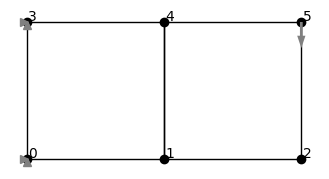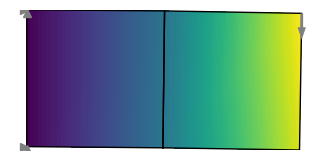Simple finite element assemblers for linear elasticity with PyTorch. The advantage of using PyTorch is the ability to efficiently compute sensitivities and use them in structural optimization.
The subdirectory examples->basic contains a couple of Jupyter Notebooks demonstrating the use of torch-fem for trusses, planar problems, shells and solids.
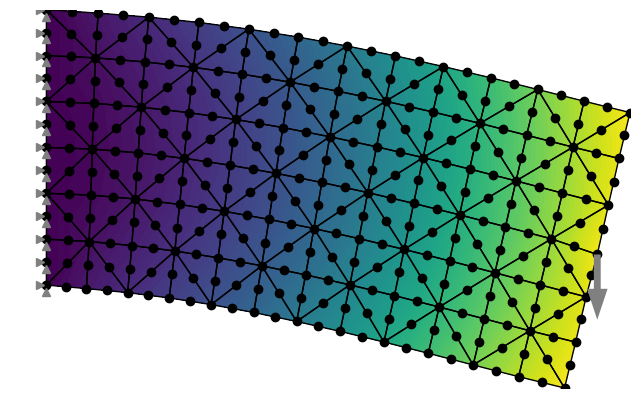
Simple cantilever beam: There are examples with linear and quadratic triangles and quads.
The subdirectory examples->optimization demonstrates the use of torch-fem for optimization of structures (e.g. topology optimization, composite orientation optimization).
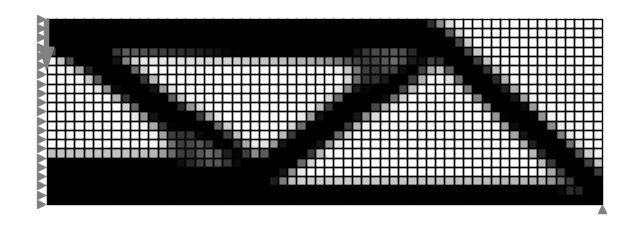
Simple topology optimization of a MBB beam: You can switch between analytical sensitivities and autograd sensitivities.
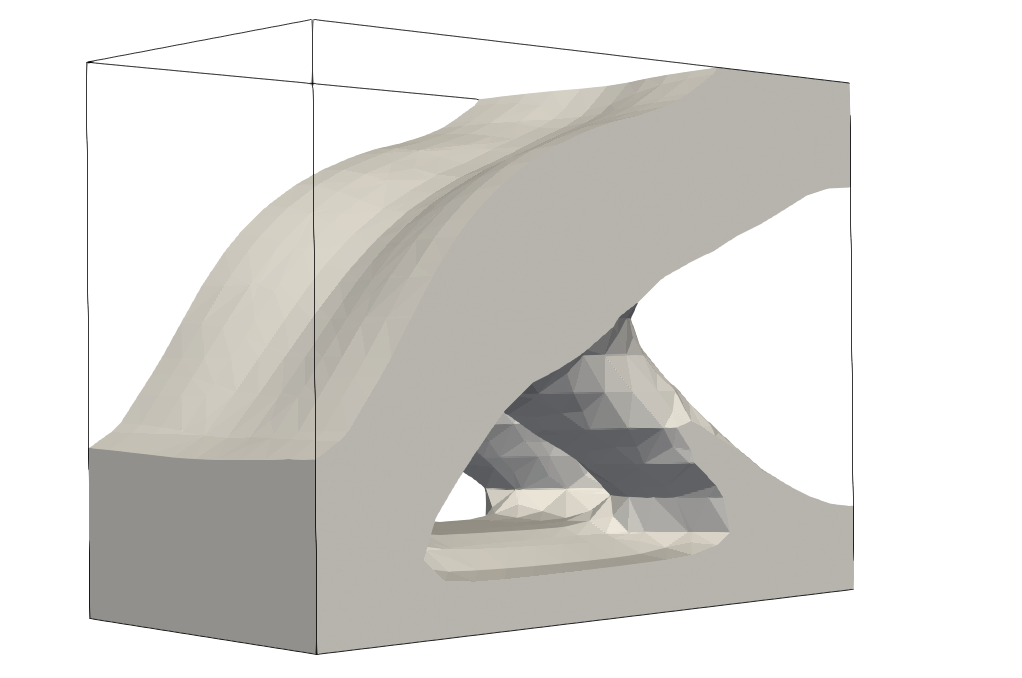
Simple topology optimization of a 3D beam: The model is exported to Paraview for visualization.
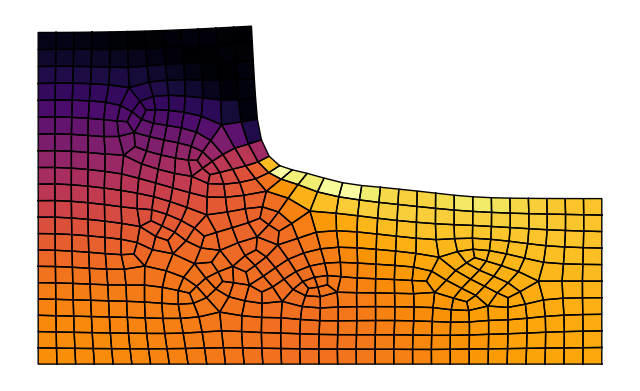
Simple shape optimization of a fillet: The shape is morphed with shape basis vectors and MMA + autograd is used to minimize the maximum stress.
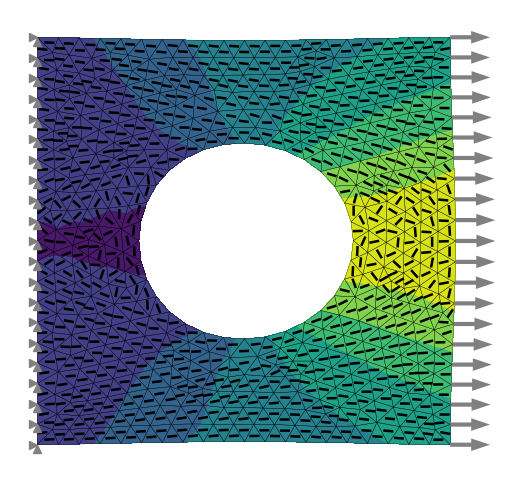
Simple fiber orientation optimization of a plate with a hole: Compliance is minimized by optimizing the fiber orientation of an anisotropic material using automatic differentiation w.r.t. element-wise fiber angles.
Your may install torch-fem via pip with
pip install torch-fem
This is a minimal example of how to use torch-fem to solve a simple cantilever problem.
from torchfem import Planar
from torchfem.materials import IsotropicPlaneStress
# Define a (minimal) mesh
nodes = torch.tensor([[0.0, 0.0], [1.0, 0.0], [2.0, 0.0], [0.0, 1.0], [1.0, 1.0], [2.0, 1.0]])
elements = torch.tensor([[0, 1, 4, 3], [1, 2, 5, 4]])
# Apply a load at the tip
tip = (nodes[:, 0] == 2.0) & (nodes[:, 1] == 1.0)
forces = torch.zeros_like(nodes)
forces[tip, 1] = -1.0
# Constrained displacement at left end
left = nodes[:, 0] == 0.0
displacements = torch.zeros_like(nodes)
constraints = torch.zeros_like(nodes, dtype=bool)
constraints[left, :] = True
# Thickness
thickness = torch.ones(len(elements))
# Material model (plane stress)
material = IsotropicPlaneStress(E=1000.0, nu=0.3)
# Create model
cantilever = Planar(nodes, elements, forces, displacements, constraints, thickness, material.C())This creates a minimal planar FEM model:
# Solve
u, f = cantilever.solve()
# Plot
cantilever.plot(u, node_property=torch.norm(u, dim=1), node_markers=True)This solves the model and plots the result:
The following benchmarks were performed on a cube subjected to a one dimensional extension. The cube is discretized with N x N x N linear hexahedral elements, has a side length of 1.0 and is made of a material with Young's modulus of 1000.0 and Poisson's ratio of 0.3. The cube is fixed at one end and a displacement of 0.1 is applied at the other end. The benchmark measures the forward time to assemble the stiffness matrix and the time to solve the linear system. In addition, it measures the backward time to compute the sensitivities of the sum of displacements with respect to forces.
Python 3.10 with Apple Accelerate
| N | DOFs | FWD Time | FWD Memory | BWD Time | BWD Memory |
|---|---|---|---|---|---|
| 10 | 3000 | 0.75s | 23.59 MB | 0.59s | 0.09 MB |
| 20 | 24000 | 3.37s | 439.23 MB | 2.82s | 227.05 MB |
| 30 | 81000 | 3.09s | 728.31 MB | 1.47s | 0.06 MB |
| 40 | 192000 | 7.84s | 807.41 MB | 3.99s | 217.56 MB |
| 50 | 375000 | 16.29s | 1211.27 MB | 9.50s | 433.30 MB |
| 60 | 648000 | 30.78s | 2638.23 MB | 19.17s | 1484.67 MB |
| 70 | 1029000 | 55.14s | 3546.22 MB | 34.41s | 1997.77 MB |
| 80 | 1536000 | 87.83s | 5066.81 MB | 56.23s | 3594.27 MB |
| 90 | 2187000 | 131.09s | 7795.83 MB | 107.40s | 5020.55 MB |
Python 3.12 with openBLAS
| N | DOFs | FWD Time | FWD Memory | BWD Time | BWD Memory |
|---|---|---|---|---|---|
| 10 | 3000 | 1.42s | 17.27 MB | 1.87s | 0.00 MB |
| 20 | 24000 | 1.30s | 160.49 MB | 0.98s | 62.64 MB |
| 30 | 81000 | 2.76s | 480.52 MB | 2.16s | 305.76 MB |
| 40 | 192000 | 6.68s | 1732.11 MB | 5.15s | 762.89 MB |
| 50 | 375000 | 12.51s | 3030.36 MB | 11.29s | 1044.85 MB |
| 60 | 648000 | 22.94s | 5813.95 MB | 25.54s | 3481.15 MB |
| 70 | 1029000 | 38.81s | 7874.30 MB | 45.06s | 4704.93 MB |
| 80 | 1536000 | 63.07s | 14278.46 MB | 63.70s | 8505.52 MB |
| 90 | 2187000 | 93.47s | 16803.27 MB | 142.94s | 10995.63 MB |




